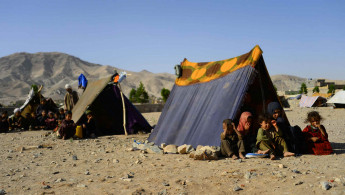Millions of Afghanis 'one step from famine', UN warns
The United Nations humanitarian envoy to Afghanistan on Tuesday warned that 3.6 million people in the war-torn country were "one step away from famine" because of the drought that has affected much of the land in 2018.
Speaking ahead of a high-level international meeting on Afghanistan at the UN in Geneva, Toby Lanzer also warned that the ongoing conflict and the drought - the worst in Afghanistan's living memory - had forced half a million people from their homes.
Still, Lanzer was optimistic about Afghanistan's future, saying the country's people had a "tremendous hunger for peace", despite enduring almost four decades of instability.
He added that the UN stood by the Kabul government and people as they worked for peace and stability, but insisted that any effort would have to be "Afghan-owned and Afghan-led" to stand a chance of success.
A dry spell mainly across the northern and western parts of the war-torn country has devastated crops, livestock and water supplies.
The drought comes at a terrible time for the country, which is already grappling with a 17-year conflict and have only just managed to hold a parliamentary elections three years late.
Twitter Post
|
On Saturday, the UN Refugee Agency began its programme to airlift thousands of tents to people displaced by both drought and conflict.
UNHCR spokesperson Babar Baloch said in a statement:"Together the drought and ongoing conflict have seen over quarter of a million Afghans being displaced in this region of the country since April."
"Currently, some 220,000 families are living in makeshift shelters in the western provinces of Herat, Badghis and Ghor. And, with winter approaching, in conditions that are increasingly desperate. Already we are seeing an increase in child deaths," he added.
A further eight million people were said to be in the "crisis" phase of the food insecurity index, two steps away from famine. The crisis phase includes people with "food consumption gaps with high or above usual acute malnutrition".
Experts say climate change is fuelling or causing the rain and snow shortages that have led to drought.
Eighty percent of conflicts in Afghanistan are over resources, including those related to food insecurity, according to the UN's Enivornment Programme.
Agencies contributed to this report.
Follow us on Twitter: @The_NewArab





 Follow the Middle East's top stories in English at The New Arab on Google News
Follow the Middle East's top stories in English at The New Arab on Google News
![The UAE is widely suspected of arming the RSF militia [Getty]](/sites/default/files/styles/image_330x185/public/2024-11/GettyImages-472529908.jpg?h=69f2b9d0&itok=Yauw3YTG)
![Netanyahu furiously denounced the ICC [Getty]](/sites/default/files/styles/image_330x185/public/2024-11/GettyImages-2169352575.jpg?h=199d8c1f&itok=-vRiruf5)
![Both Hamas and the Palestinian Authority welcomed the ICC arrest warrants [Getty]](/sites/default/files/styles/image_330x185/public/2024-11/GettyImages-2178351173.jpg?h=199d8c1f&itok=TV858iVg)